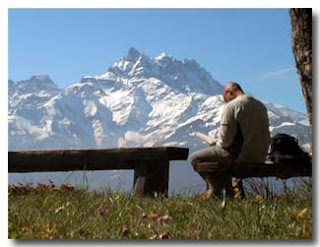Yesterday, I was thinking about the watershed issues of Christiandom and within evangelicalism and I found a great article on it. What better man would there be to define the term, watershed, than Francis Schaeffer, who lived in the Alps of Switzerland for seven years and was a great Christian theologian and philosopher? The article is from a book, he wrote 25 years ago and it's pretty applicable for today.

Read the whole chapter HEREA Watershed
by Francis Schaeffer
Not far from where we live in Switzerland is a high ridge of rock with a valley on both sides. One time I was there when there was snow on the ground along that ridge. The snow was lying there unbroken, a seeming unity. However, that unity was an illusion, for it lay along a great divide; it lay along a watershed. One portion of the snow when it melted would flow into one valley. The snow which lay close beside would flow into another valley when it melted.
Now it just so happens on that particular ridge that the melting snow which flows down one side of that ridge goes down into a valley, into a small river, and then down into the Rhine River. The Rhine then flows on through Germany and the water ends up in the cold waters of the North Sea. The water from the snow that started out so close along that watershed on the other side of the ridge, when this snow melts, drops off sharply down the ridge into the Rhone Valley. This water flows into Lac Leman — or as it is known in the English-speaking world, Lake Geneva —and then goes down below that into the Rhone River which flows through France and into the warm waters of the Mediterranean.The snow lies along that watershed, unbroken, as a seeming unity. But when it melts, where it ends in its destinations is literally a thousand miles apart. That is a watershed. That is what a watershed is. A watershed divides. A clear line can be drawn between what seems at first to be the same or at least very close, but in reality ends in very different situations. In a watershed there is a line.
A House Divided
What does this illustration have to do with the evangelical world today? I would suggest that it is a very accurate description of what is happening. Evangelicals today are facing a watershed concerning the nature of biblical inspiration and authority. It is a watershed issue in very much the same sense as described in the illustration. Within evangelicalism there are a growing number who are modifying their views on the inerrancy of the Bible so that the full authority of Scripture is completely undercut. But it is happening in very subtle ways. Like the snow lying side-by-side on the ridge, the new views on biblical authority often seem at first glance not to be so very far from what evangelicals, until just recently, have always believed. But also, like the snow lying side-by-side on the ridge, the new views when followed consistently end up a thousand miles apart.What may seem like a minor difference at first, in the end makes all the difference in the world. It makes all the difference, as we might expect, in things pertaining to theology, doctrine and spiritual matters, but it also makes all the difference in things pertaining to the daily Christian life and how we as Christians are to relate to the world around us. In other words, compromising the full authority of Scripture eventually affects what it means to be a Christian theologically and how we live in the full spectrum of human life.
-Chapter 2 from The Great Evangelical Disaster (Crossway Books, 1984)
L'Abri Fellowship International HERE and L'Abri newsletter HERE






No comments:
Post a Comment